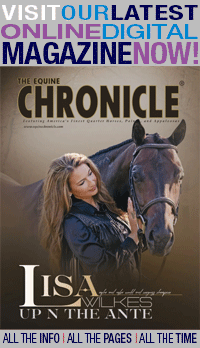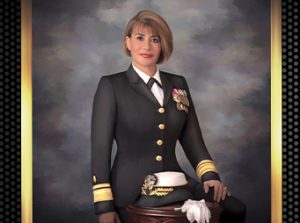In Service To Our Country – Tina Alvarado Shanahan
Click here to read the complete article
394 – October 2019
A certain determination was evident in Tina Shanahan, even in her early years. As the youngest child of seven living on an Air Force base in Anchorage, Alaska, there was neither the money nor much attention given to the pleas from Tina for a horse in her life. She befriended, or perhaps irritated, the barn manager of the base’s stable and finagled a deal that had her feeding, mucking, and doing hours of other barn work in exchange for time in the saddle. She learned how to ride in the snow, an hour per week, and she cherishes the memories of galloping one of the base horses through snow-covered fields with a snow saucer tied to the saddle horn and a couple of giggling friends being pulled behind.
That same sort of enthusiasm and determination carried her through a military career, during which she racked up numerous awards and honors, including two Legion of Merit awards, one of the military’s top distinctions, and she became the highest ranking woman of Hispanic descent in the U.S. Navy.
In November 2019, Shanahan will add one more accolade to an already illustrious list. She will be inducted into the National Cowgirl Hall of Fame for her contributions to the cowgirl legacy. Her lifelong passion for horses and her 30-year distinguished service to our nation helped earn her the spot. Her official induction will occur at the organization’s 44th annual induction ceremony at the National Cowgirl Museum in Fort Worth, Texas.
Shanahan credits much of her success to others, but she highlights the lessons learned early on from time spent with horses as some of the most important. “Horses have a way of empowering little girls and building inner strength and self-confidence. At the age of ten, there’s something awe-inspiring about being able to relate to, communicate with, and control a 1,200 pound animal,” Shanahan says. “At the barn, you learn to put the horse’s needs above your own, be resourceful, fix things, problem-solve, get dirty, and enjoy the great outdoors. Being in the military is a lot like that. You become resolute, and, if asked, you will absolutely put the love of your country above your own needs. You welcome challenges. You have to be okay with discomfort in an austere environment, whether it’s living in the sand, dirt, or in a tent with 40 other people. Horses taught me to be independent, to work hard to achieve your goals, and that when you work hard, you can absolutely achieve what you thought was impossible. All of those lessons learned at the barn carried over so that I can say, with certainty, that horses helped make me the leader I grew to be in the Navy. Horses helped make me an Admiral. I know that sounds funny; but, in my mind, it’s true,” Shanahan says.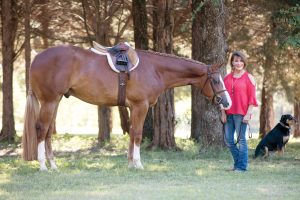
Shanahan was aware of the nomination to the Cowgirl Hall of Fame by APHA, but she was advised not to get her hopes up. She was told that nobody gets in on the first try. But, the call she received in early June from Patricia Riley, the Cowgirl Hall of Fame Executive Director, defied that sentiment. She shared the news that Shanahan would be one of five women to receive the prestigious award. “I was over-the-top excited. Soon after, Billy Smith from APHA called me to ask if I had gotten word. He shared my excitement, and I told him how grateful and honored I was that APHA put all the effort into my nomination application. It’s an extensive process and took about six months to complete. I wouldn’t be receiving this award had it not been for their efforts,” Shanahan says.
As a registered nurse, Shanahan began her Navy career as a direct commissioned officer and served in support of Operations Desert Shield and Desert Storm. Later, she served in support of Operations Noble Eagle and Enduring Freedom. During those times, she held a variety of leadership positions including officer in charge, executive officer, administrative officer, and training officer. Those leadership roles would continue to pile up. She served as commanding officer of EMF Dallas One, a commissioned expeditionary medicine unit. In 2013, Shanahan was promoted to Rear Admiral and promoted again in 2015 to Rear Admiral Upper Half. At that time, she became the commander of Navy Reserve Expeditionary Medicine worldwide and was the first female of Hispanic descent to reach the rank of two-star. When she retired in December of 2018, she was leading the entire Navy Medicine Reserve Component and reporting directly to the Navy Surgeon General.
“I credit much of my success in Navy leadership to being able to transfer the skills that I learned from a lifetime of being around horses to success in a professional capacity. My proudest moments in the horse industry aren’t the titles that I’ve won, but the fact that what I’ve learned from horses has led me to achieve positions of increasing responsibility and leadership,” Shanahan says. “With the right approach, horses allow you to lead them, but you have to earn that right through mutual respect. The same is true with people. As an Admiral, I could certainly give orders, but horses taught me that motivation creates much more sustainable success. In the Navy, leaders must send their sailors into harm’s way where they may pay the ultimate sacrifice. That can’t feel like an order. Instead, you must instill in them the passion to feel that being a part of something bigger than themselves is an honor, and the mission becomes paramount to every member of the team. I first learned the power of a team approach through horses. You can give orders to your horse all day long, but a true champion is made when you combine passion with patience and knowledge and then adapt a quiet leadership demeanor. That recipe leads the horse and rider team to long-term success.”
Shanahan also notes that horses taught her more subtle skills in leadership, including the ability to read body language. “I can’t tell you how many times that has helped me. A lot of times, when people talk, what they say is not at all what they mean, so being able to read body language and the subtleties of it is a real gift. Nowhere can you learn that as well as you can with horses. When you’re working with horses, you learn to read their ears, eyes, and whole demeanor. You learn when they’re fearful, angry, calm, or in pain. Horses taught me the value of communication without words, and that’s just one way they made me a better, more sensitive leader,” Shanahan says.
Regardless of all of the self-taught leadership skills she’s learned through her experience with horses, Shanahan recognizes that success is not a solo journey. During her 52 years in the horse industry, she has emulated some of the leadership skills she’s witnessed from the best in the horse industry. She has spent the past nine years under the guidance of trainers, Tim and Shannon Gillespie. During her time with them, she won three consecutive Hunter Under Saddle championships at the APHA World Show aboard two different horses: Zip Me All the Way Up (2011 and 2012) and A Certain Kinda Dream (2013) among many other top prizes.
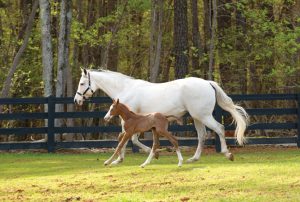 “She has been in the industry for a very long time and her juggling such a challenging career in the Navy and still making time to be involved with APHA, NSBA, and raise horses, while being one of the highest ranking females in our military, is such an inspiration. She’s a personal role model for me,” Shannon Gillespie says. “In the time she’s been our customer, her responsibilities to the Navy became huge. Even then, though, the horses remained a big priority for her. She did what she had to do to make it work, still making it a priority to compete at a high level and learn new horses and learn new events, even when she was on active duty. It’s a lot for anyone, especially someone with the responsibilities that she has.”
“She has been in the industry for a very long time and her juggling such a challenging career in the Navy and still making time to be involved with APHA, NSBA, and raise horses, while being one of the highest ranking females in our military, is such an inspiration. She’s a personal role model for me,” Shannon Gillespie says. “In the time she’s been our customer, her responsibilities to the Navy became huge. Even then, though, the horses remained a big priority for her. She did what she had to do to make it work, still making it a priority to compete at a high level and learn new horses and learn new events, even when she was on active duty. It’s a lot for anyone, especially someone with the responsibilities that she has.”
So how did Shanahan go from riding Air Force base horses to holding multiple World Champion titles? When she was 16 years old, her father finally gave in to horse ownership. “I had tortured him for a horse since I was a little girl, and every year I looked under the tree for my pony,” she recalls. Her father traded his old truck for Shanahan’s first horse, a Quarter Horse named Molly Bee. However, he made it very clear that, though he bought her the horse, Shanahan would need to find a way to keep it fed and cared for properly. So, by working off her board through feedings, teaching beginner lessons, and cleaning stalls, Shanahan found a way to keep Molly Bee happy and healthy. Shortly after, Shanahan made her show pen debut at local shows.
Fast forward through nursing school, entering the Navy, starting a family, the multiple tours of duty, and her ever-increasing professional leadership roles, in 1998, Shanahan–a then Lieutenant Commander with three grade-school aged sons–had to take a small step back from her passion for horses. She was absent from the show pen for five years but never out of the industry completely. When she came back to compete, she was back with a vengeance. After purchasing, showing, and selling several young horses, she found the horse of her dreams, a 2002, double registered, gray mare named I Blaze to Differ, known as “Possum” around the barn. In their first year together, this new team noviced out of six events. In 2008, she and Possum won the year-end APHA #1 Novice Amateur All Around title. At that time, Shanahan was juggling showing horses with a Navy assignment at the Pentagon, raising a family from afar, and completing graduate school.
After some years, Shanahan was promoted to the rank of Captain and was selected for her commanding officer tour in Fort Worth. By then, she had the years required to retire and since very few Captains and even fewer women get promoted to the rank of Admiral, she began to prepare for retirement. She then started building her dream barn at her family’s North Carolina home. Upon completion of her tour and the barn, she brought Possum home and began what she calls her home breeding program. She continued to keep her show horses in training with Tim and Shannon and followed them from Ohio to their new home in Texas.
“I’ve started out slow. I’m not breeding for champions, just for fun. I love my mare so much and, in her retirement from the show pen, this is her new job,” Shanahan explains. Possum was first bred to APHA/AQHA double-registered stud Living Large, and her first two foals by him were both double-registered, beautiful grays like their mother and they inherited much of her all-around talent.
Shanahan currently has a double-registered yearling and weanling by Loping My Best. Possum, who is still on the all-time leading point list for Hunter Under Saddle, is currently bred back to Won Last Stand. She says, “I’m excited because this one is sure to be a Hunt Seater, so I’m taking my breeding program in a little different direction.”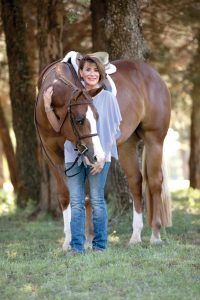
Shanahan retired in December of last year after 30 years of military service. Her husband, Kieran, has supported her horse habit from the beginning and can be seen cheering her on from the rail. The couple has three grown children, Kate, Jimmy, and Patrick. When Shanahan first brought Possum home, Jimmy gifted her with a miniature donkey for Mother’s Day so that her mare would have a pasture mate. Shanahan laughs, “There’s nothing that says, ‘I love you, Mom,’ quite like a miniature ass!”
In retirement, Shanahan is happy to finally be home and enjoys spending time caring for her horses, dogs, and volunteering in a variety of capacities in the healthcare field. She’s often called upon as a public speaker on the topic of women and leadership. Another of Tina’s passions is mentoring young people. At one point, during the height of her career, she started a weeklong horse camp for youth in her area that were disadvantaged or would otherwise have no opportunity to engage in the horse industry.
“I recognized the powerful impact horses had in making me strong, independent, and self-assured. I wanted to pass that on to other young girls, so I consulted with our church pastor to find kids who were horse crazy, but could not afford a horse camp or lessons, as was my situation as a young girl. I also enrolled some girls from the base whose mom or dad was deployed, and I charged nothing for the camp,” Shanahan says. During that week, students were assigned a horse, shown the basics of feeding, grooming, and general horse care by a mentor, and rode every morning and again in the afternoon. The campers saw farrier demonstrations, took field trips to places like North Carolina State Vet School, and embraced the opportunity to learn lifelong skills from their horse teachers. The week-long immersion camp culminated with each student showing at a local open horse show, where they were all able to tack their own horses, ride independently, and claim their ribbons as they left the show pen.
“I keep in touch with many of those girls and, in fact, every single kid that attended still has horses in their lives in some way. They comment on how rough and ready it made them,” Shanahan says, noting that many were shy and some fearful but emerged confident and more outgoing. One attendee, whose father was a Marine Corps officer and deployed at the time of camp, is the only female in her engineering class, Shanahan proudly reports. Recently, Shanahan received a call from another former camper who explained how much of an impact that week had on her life. Shanahan was recognized for her efforts with the Triangle Business Journal Women in Leadership Mentoring Award.
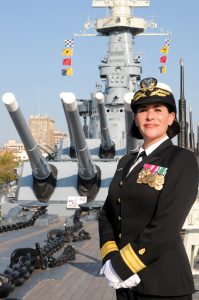
What the girls called “Tina’s Boot Camp” required a lot of leg work–everything from borrowing well-broke horses and convincing a cowboy friend of Shanahan’s to open up his farm for the group to recruiting a counselor and lining up volunteers to help make meals. Shanahan ran the camp for three years in a row until her Navy duty just didn’t allow it anymore. But now, with a little more time on her hands, she’s thinking about doing it again. Of course, it seems like a big proposition, but empowering youth and developing leaders through horses will always be worth it–from Shanahan’s perspective–and she enjoys the opportunity to give back.
“The most important thing to know about leadership is that it’s never about you. If you make it about you and not those you have the honor to lead, or you focus on the power or even the huge responsibility, you probably won’t achieve much success. I accepted leadership opportunities to serve a greater good, which is also why I became a nurse. To me, leadership is about inspiring others to perform a mission, achieve new heights, or pioneer a new way of doing things,” Shanahan says. Clearly, she’s no stranger to any of those things. In fact, she continues to pave the way.
